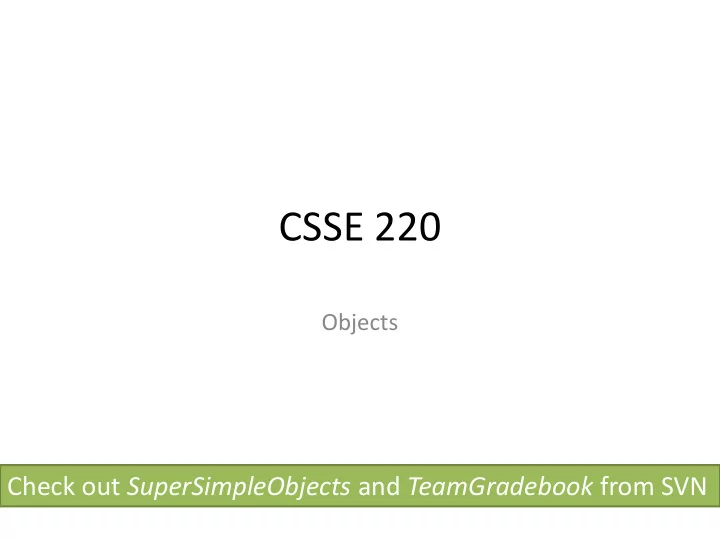

CSSE 220 Objects Check out SuperSimpleObjects and TeamGradebook from SVN
Plan for today • Talk about object references and box and pointer diagrams • Talk about static methods • Continue working on writing your own classes • Get started on TeamGradebook, your new assignment
Exercise • Complete the StudentAssignments problem in the SuperSimpleObject project (or the one from last class)
TeamGradebook • Just a quick demo
Differences between primitive types and object types in Java OBJECT REFERENCES
What Do Variables Really Store? • Variables of primitive type store values • Variables of class type store references 10 20 box 5 x 10 5 y 20 1. int x = 10; 2. int y = 20; 3. Rectangle box = new Rectangle(x, y, 5, 5);
Assignment Copies Values • Actual value for number types • Reference value for object types – The actual object is not copied × 9 5 – The reference value (“the pointer”) is copied × 10 6 • Consider: box x 10 7 1. int x = 10; × 20 box2 8 y 10 2. int y = x; 3. y = 20; 4. Rectangle box = new Rectangle(5, 6, 7, 8); 5. Rectangle box2 = box; 6. box2.translate(4, 4);
Reference vs Value Equality What gets printed? What gets printed here? ArrayList<Integer> l1 = new ArrayList<Integer>(); String t1 = "hello"; l1.add(1); String t2 = "hello"; l1.add(2); System.out.println(t1 == t2); ArrayList<Integer> l2 = new ArrayList<Integer>(); System.out.println(t1.equals(t2)); l2.add(1); l2.add(2); May print true or false Prints false System.out.println(l1 == l2); System.out.println(l1.equals(l2)); Prints true Prints true == operator compares references of two objects 0 1 0 1 l2 l1 1 2 1 2 equals(), in general, compares values of two objects
Boxes and lines exercise Q1 – Q11
Understanding static STATIC
Why fields can’t always be static public static void main(String[] args) { public class Student { Student a = new Student("Adam", 'A'); private String name; Student b = new Student("Bryan", 'B'); private char grade; Student c = new Student("Chris", 'C'); System. out.println(a); public Student( System. out.println(b); String name, System. out.println(c); char grade){ } this.name = name; this.grade = grade; } @Override OUTPUT: public String toString() { Adam has a grade of A return name + Bryan has a grade of B " has a grade of " Chris has a grade of C + grade; } }
Why not make the grade static? public static void main(String[] args) { public class Student { Student a = new Student("Adam", 'A'); private String name; Student b = new Student("Bryan", 'B'); private static char grade; Student c = new Student("Chris", 'C'); System. out.println(a); public Student( System. out.println(b); String name, System. out.println(c); char grade){ } this.name = name; this.grade = grade; } OUTPUT: @Override Adam has a grade of C public String toString() { Bryan has a grade of C return name+ Chris has a grade of C " has a grade of " + grade; Static means there's only one instance of a } } field/method for every instance of a class that's created. So when you change a grade, they all change.
When do we make methods static? • Utility Methods – Things like abs, sqrt, etc. – Don’t need an instance of a class to run them • How do I know? – No references to non-static fields/methods – No “this” keyword used in method
public class Car { double mileage; //other stuff public double getMilesTravelled() { return this.mileage; } public static double convertMilesToKm(double numberOfMiles) { return numberOfMiles * 1.609344f; } } //Elsewhere… //requires you to have a car object Car myCar = new Car(); //requires you to have a car object System. out.println(myCar.getMilesTravelled());//output depends on code //can be called on the class Car itself System. out.println(Car.convertMilesToKm(77));//output is 123.919488
public class Bicycle { private int speed; private static int numCreated = 0; public Bicycle(int speed) { this.speed = speed; Bicycle.numCreated++; } public int getSpeed() { return this.speed; } public static int getNumCreated() { return Bicycle.numCreated; } } / /No requirement to have a Bicycle yet… System. out .println(Bicycle.getNumCreated()); Bicycle myBike1 = new Bicycle( 18 ); Bicycle myBike2 = new Bicycle( 1 ); System. out .println(Bicycle.getNumCreated() + " " + myBike1.getSpeed()); 0 Q12 - Q16 2 18
Exercise • Complete the StudentAssignments problem in the SuperSimpleObject project • Start working on the TeamGradeBook homework. Try to finish the code for both add-student, add-absence and get-absences today • If you are confused about what to do, get help!
Recommend
More recommend